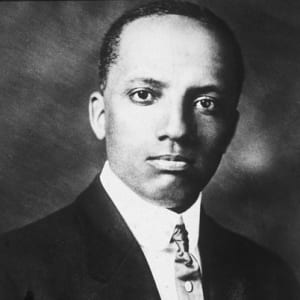
We end Black History Month with a look at the man who started it all nearly 90 years ago.
February is Black History Month. The observance began as Negro History Week and was started in 1926 by a gifted scholar and educator named Carter Godwin Woodson as a way to focus on the often-untold history and achievements of people of African descent.
Up until the dawn of the 20th century, it was the untrue yet widely held belief among both whites and Blacks that African-Americans had no history of any significance of importance beyond slavery, even though there was concrete evidence that people of African descent had made significant contributions to world history on every level–socially, politically and economically. But these contributions would remain largely unknown, unsung and unnoticed until the diligent work of Woodson. This scholar and champion of African history had humble beginnings.
Woodson was born in New Canton, Va., on Dec. 19, 1875. His parents, James and Eliza Riddle Woodson, were former slaves. His family was large and poor, making it impossible for him to attend school.
Young Carter’s days were spent working on the family farm and, later, in the Kentucky coal mines, but nothing would stop him from learning. By age 17, he had taught himself the fundamentals of basic school subjects. By age 20, he began his formal education. But the late start didn’t stop Woodson from excelling. The brilliant student graduated from high school in less than two years.
Soon after, Woodson began teaching high school and writing articles. He attended colleges in West Virginia, Kentucky, Pennsylvania and Illinois, earning a Bachelor of Arts from the University of Chicago in 1907 and a master’s degree in 1908. He earned his Ph.D. from Harvard in 1912, the second Black after W.E.B. DuBois to do so. He traveled to Europe and Asia and attended the Sorbonne in France.
Woodson began teaching in the Washington, D.C., public school system and at Howard University. He realized that African-Americans had a rich, untold history that they should be proud of and that all Americans should understand. He believed that education and knowledge of one’s history was the key to success. With that, he dedicated his career to teaching other scholars about the importance of Black history.
“History,” he said, “was not the mere gathering of facts. The object of historical study is to arrive at a reasonable interpretation of the facts. It must include some description of the social conditions of the period being studied. African-Americans had suffered because their true history was not being told correctly.”
Woodson worked with the Washington, D.C., branch of the NAACP, but was not satisfied with the way things were going. In 1915, he wrote a letter to Chairman Archibald Grimke in which he made two proposals. His first suggestion was that the branch should have an office where people could come and report concerns and have those issues dealt with. His second proposal was that a canvasser be assigned to solicit members and subscribers for the Crisis, which was the NAACP’s magazine, edited by DuBois. DuBois added that the association should not support businesses that did not treat Blacks equally. The NAACP was not impressed with Woodson’s suggestions. His tenuous relationship with Grimke forced the end of his relationship with the organization. 
4,283 total views, 0 views today


